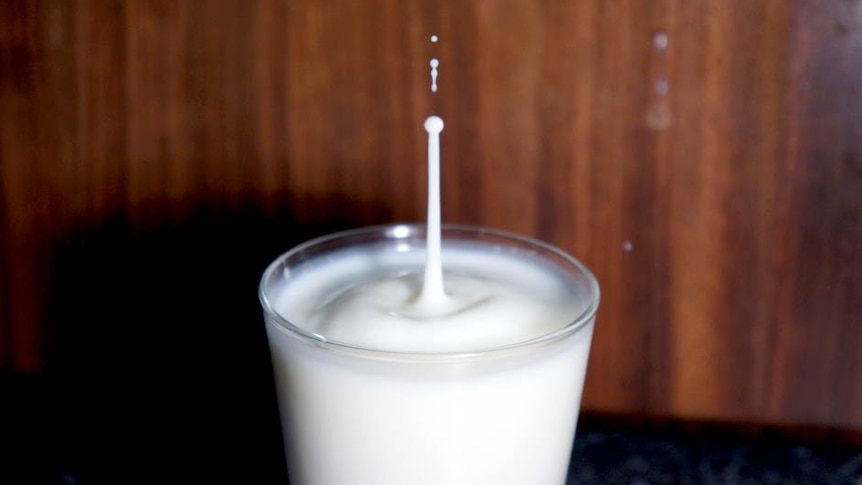Samantha Donovan: The New Zealand dairy giant Fonterra is pulling out of Australia and planning to sell all its brands to the French company Lactalis. Those brands include Perfect Italiano Cheese, Western Star Butter and Mainland Cheese. The sale still needs approval from the Foreign Investment Review Board, but if it goes ahead Lactalis would be by far the biggest dairy processor in Australia and farmers are worried that would give the French company too much market power. Luke Radford reports.
Luke Radford: Every time you pour a glass of milk, crack into some yoghurt or rip open a bag of cheese, the milk that went into it has almost certainly been through one of Australia’s dairy processing companies. One of the largest is Fonterra, a New Zealand based cooperative. Renee Dedoncker is Fonterra’s managing director of global consumer business.
Rene Dedoncker: Look it is a big day for dairy. Today the Fonterra cooperative has announced that it has agreed to the sale of its global consumer business which includes Oceania, Australia and Sri Lanka to Lactalis for $3.845 billion, so just over $3.8 billion NZD, so NZ dollars.
Luke Radford: Fonterra’s decision to sell its global business is a seismic shift in the Australian dairy industry. Lactalis, which is French owned, is already the largest dairy company in the world. This purchase would also make it the largest dairy company in Australia and it has the tick of approval from the consumer watchdog the ACCC.
Rene Dedoncker: The ACCC said very clearly that Lactalis and Fonterra both currently acquire raw milk in Australia, so there was an investigation if you like, a review and the outcome of that is that there is limited overlap and that the acquisition is unlikely to result in a substantial lessening of competition for raw milk, so the ACCC as a regulator have approved it.
Luke Radford: But not everyone agrees. President of the United Dairy Farmers of Victoria, Bernie Free, is concerned that they could rationalise operations and close some factories.
Bernie Free: You’re going to spend that sort of money, you’ve got to look seriously at all of those costs. It means that there’s the possibility of some factories closing which is not good for the local community or the dairy farmers in that area. We need a strong dairying industry and we need strong players and we need competition.
Luke Radford: The national advocacy group Australian Dairy Farmers is also concerned about the sale. It put a submission to the ACCC arguing that the sale would threaten competition in Australia, which was ultimately rejected. Ben Bennett is the group’s president.
Ben Bennett: We’re now going to have, as it looks like going forward, three companies controlling 70% of the raw milk. But not only that, they control the peak processing capacity of the industry. So all the little companies that sort of rely on milk, say more like Monday to Friday, they’ve got to put that surplus somewhere else.
Luke Radford: Meanwhile, the farmers who actually sell milk to Fonterra will be watching on anxiously. Paul Weller is the chair of the Fonterra Suppliers Council, which represents the farmers who supply milk to Fonterra.
Paul Weller: Any contracts that are there will be honoured. That’s been made quite clear and that was one of our things all the way through, that contracts will be honoured to give farmers certainty. And that’s been clear for the last 12, 18 months that that would be part of it. If Lactalis, or when they buy, want to continue to have the same level of supply, they’ll need to continue to have a good relationship with their suppliers.
Luke Radford: Lactalis has not responded to the ABC’s requests for an interview, but in a statement says it’s delighted to become a key partner to Fonterra over the long term and looks forward to welcoming new teams to the Lactalis family. So at the end of the day, what does the sale mean for consumers? Fonterra owns Perfect Italiano cheese, Western Star butter and Mainland cheese, all of which will become Lactalis brands if the sale goes through. Michael Harvey is a senior analyst at Rabobank.
Michael Harvey: In reality, it shouldn’t mean too much both for farm suppliers or for consumers. Yes, assets are changing ownership and brands are moving around, but at the end of the day, the brands will still be on the supermarket shelf. They’ll still need milk to produce those brands. So behind the scenes, there shouldn’t be too much disruption, but there’s always a little bit of uncertainty around what’s going on behind the scenes as you see these sorts of events occur. But at the end of the day, they’re acquiring the assets to run them as normal moving forward.
Luke Radford: The sale still requires several more steps before it goes ahead, including approval by the Foreign Investment Review Board in Australia.
Samantha Donovan: The report from Luke Radford and Warwick Long.


Dining and Cooking